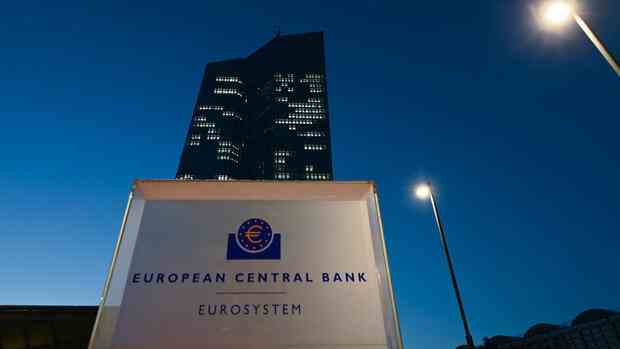The ECB has further increased interest rates in the euro area. It raised the key interest rate by 0.5 percentage points to 2.5 percent. The currently even more important interest rate that banks receive for their deposits at the ECB rose from 1.5 to 2.0 percent. The interest rate hike is therefore smaller than in September and October, when the ECB had increased it by 0.75 percentage points. This was expected in advance.
However, some of the currency watchdogs spoke out in favor of another hike of 75 basis points on Thursday. Lagarde admitted this implicitly. “Some may have wanted a little more, others a little less.”
Top jobs of the day
Find the best jobs now and
be notified by email.
In addition, the ECB is now signaling that it no longer intends to renew all maturing bonds from its older purchase program APP from March. Papers in the amount of 15 billion euros per month are to expire.
So far, the ECB had renewed all maturing bonds. The central bank is thus initiating the reduction of its bond portfolio. This currently amounts to around five trillion euros, which are mainly invested in government bonds from euro countries.
The interest rate prospects
However, the most important message for the markets was Christine Lagarde’s announcement that interest rates have yet to rise significantly and at a steady pace. Based on the current data, it is currently expected that the key interest rate will have to rise at a pace of 50 basis points for some time, said Lagarde. In view of the high inflation, the ECB is prepared for a “long game”.
There is no timetable for when the increase cycle will end. However, interest rates are likely to remain in restrictive territory for a long time, i.e. at a level that slows down the economy. This is unavoidable in order to push inflation back towards the two percent target.
The market reactions
Above all, the clear announcement of further increases had a significant impact on prices. On an already weak trading day, the Dax increased its losses by a further 350 points during the Frenchwoman’s statements. In the afternoon, the leading German index was a total of 450 points or almost three percent lower at the 14,000 point mark.
Share prices were also deep in the red on other European trading venues. The leading euro zone index, the Euro Stoxx 50, also lost around 2.5 percent. The euro was 0.5 percent lower against the US dollar at 1.06 dollars.
>> Read here: “We still have a lot to do” – US Federal Reserve expects key interest rate of over five percent
The most important indices in the USA were between two and 2.5 percent in the red in morning trading. They had already turned negative the night before, following the Fed’s rate hike and the words of Fed Chair Jerome Powell.
Bond yields, on the other hand, have risen significantly. The value for a ten-year federal bond was 2.08 percent in the afternoon after 1.94 percent previously. Two-year federal bonds dropped 2.36 percent after 2.16 percent in the run-up.
That’s what economists say
The chief economist at VP Bank, Thomas Glitzel, was impressed. “Wow, you can hardly believe it today. The ECB is showing inflation its teeth,” he commented. Lagarde’s statement that several rate hikes of 50 basis points were necessary reminded him of “words from veteran economists at the Bundesbank”.
On the other hand, Commerzbank chief economist Jörg Krämer said that he would have liked a large interest rate hike of 0.75 percentage points. In his view, the ECB must “act much more decisively”. The chief economist at Dekabank, Ulrich Kater, also sees a long way to go. “Rate hikes still have a good way to go.”
The new growth and inflation forecasts
Christine Lagarde also presented new forecasts for growth and inflation in the years up to 2025. The ECB now expects an inflation rate of 6.3 percent for 2023 (previous forecast: 5.5 percent). In 2024, the inflation rate is likely to drop to 3.4 percent (2.4). The forecast for 2025 is 2.3 percent.
Core inflation, which excludes volatile energy and food prices, is forecast to be 4.2 percent in 2023, 2.8 percent in 2024 and 2.4 percent in 2025. Lagarde stressed that energy and food price increases will likely to persist in the coming months.
The short-term growth prospects have also weakened. The ECB expects the economy to grow by 0.5 percent in 2023. So far, she had assumed 0.9 percent.
It will be exciting to see how the further interest rate hikes and the reduction in the central bank balance sheet, which began in March, will affect economic development. Monetary policy generally works with a time lag, so that the restrictive effect of higher interest rates is becoming more pronounced.
However, medium-term growth forecasts remain robust. In 2024 it should be 1.9 percent (instead of 1.8 percent) and 1.8 percent in 2025. Lagarde refers to the strong labor market and the signs of relaxation in the disrupted supply chains.
More: The dispute over interest rates and inflation has shifted the balance of power in the ECB and weakened Lagarde


